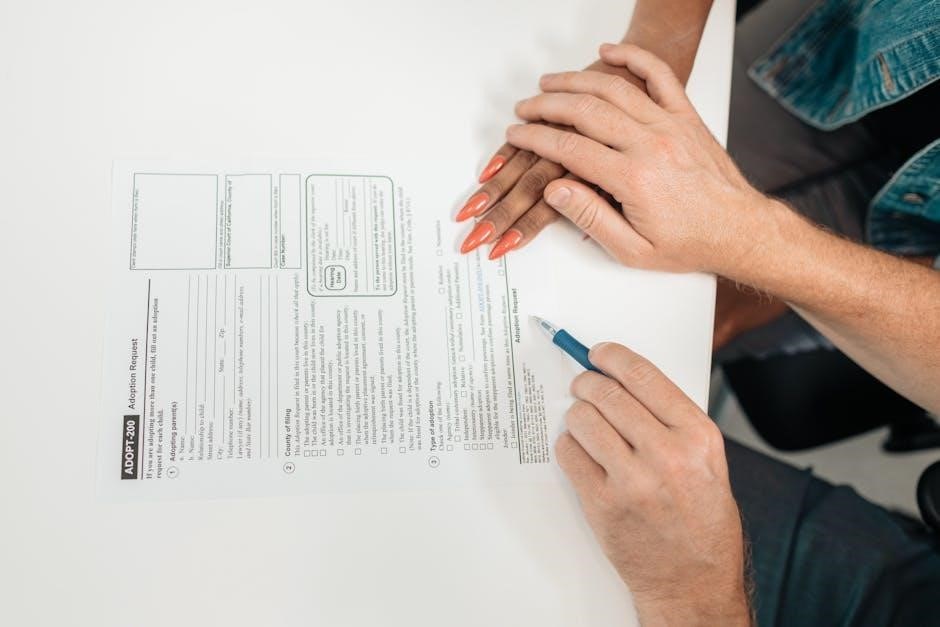Understanding the Texas Rental Application Form

The Texas Rental Application Form serves as an essential document for landlords to evaluate potential tenants. Available in PDF format‚ it streamlines the rental process by providing a standardized framework for collecting necessary information. This form ensures compliance with Texas housing laws and facilitates thorough background checks‚ helping landlords make informed decisions while maintaining legal and procedural integrity.
Overview of the Texas Rental Application Form
The Texas Rental Application Form is a standardized document designed to streamline the rental process for both landlords and tenants. It is typically provided by the Texas Association of Realtors or the Texas Apartment Association and is widely used across the state. The form is available in a convenient PDF format‚ making it easily accessible for download and completion. Its primary purpose is to collect essential information about potential tenants‚ enabling landlords to evaluate their eligibility for renting a property.
The form is structured to gather detailed personal‚ financial‚ and rental history information. It often includes sections for applicant details‚ employment history‚ income verification‚ rental references‚ and credit checks. This comprehensive approach ensures that landlords can assess the reliability and suitability of applicants. Additionally‚ the form may require applicants to disclose any criminal history or past evictions‚ which are critical factors in the tenant screening process.
One of the key benefits of the Texas Rental Application Form is its standardized format‚ which helps maintain consistency and fairness in the rental application process. Landlords can use the information provided to compare applicants and make informed decisions. For tenants‚ the form provides a clear understanding of the required documentation and criteria for approval‚ reducing ambiguity and potential disputes.
Each adult applicant is typically required to submit a separate form‚ ensuring that all parties are evaluated individually. The form also includes a section for the property details‚ such as the address and type of rental unit‚ which helps keep records organized. Furthermore‚ the Texas Rental Application Form often includes a non-refundable application fee‚ which covers the cost of processing and background checks.

Importance of the Form for Landlords and Tenants

The Texas Rental Application Form plays a crucial role in the rental process‚ offering significant benefits for both landlords and tenants. For landlords‚ the form provides a structured method to evaluate potential tenants‚ ensuring they make informed decisions about who will occupy their property. By collecting detailed information‚ including rental history‚ employment status‚ and financial stability‚ landlords can assess the likelihood of timely rent payments and proper property maintenance. This helps mitigate risks associated with tenant placement‚ such as property damage or unpaid rent.
For tenants‚ the form ensures transparency and fairness in the rental application process. It outlines the necessary criteria and documentation required‚ allowing applicants to prepare thoroughly and understand the expectations. This clarity reduces the likelihood of misunderstandings or disputes. Additionally‚ the form provides tenants with an opportunity to demonstrate their reliability and suitability as renters‚ which can be particularly important for those with limited rental history or past credit issues.
The standardized nature of the Texas Rental Application Form also promotes consistency and equality in tenant screening. Landlords are required to evaluate all applicants using the same criteria‚ which helps prevent discrimination and ensures compliance with fair housing laws. This fairness is especially important in a competitive rental market‚ where applicants may be vying for limited properties.

Key Components of the Texas Rental Application
The Texas Rental Application Form includes essential sections for personal information‚ rental history‚ employment details‚ and financial data. Applicants must provide identification‚ previous landlords’ contact information‚ and income verification. The form also outlines the non-refundable application fee‚ which covers background and credit checks. These components help landlords assess tenant suitability while ensuring a fair and structured evaluation process for all applicants;
Required Information and Documentation
The Texas Rental Application Form requires prospective tenants to provide detailed personal and financial information to facilitate a thorough evaluation. Applicants must submit their full legal name‚ date of birth‚ and contact information. A valid government-issued ID‚ such as a driver’s license or passport‚ is typically mandatory to verify identity. Rental history is another critical component‚ with applicants often asked to list previous landlords or property managers‚ including their contact details‚ to enable reference checks.
Employment information is also essential‚ requiring applicants to disclose their current employer‚ job title‚ and duration of employment. Income verification‚ such as recent pay stubs‚ W-2 forms‚ or bank statements‚ may be requested to assess financial stability. Self-employed individuals may need to provide additional documentation‚ such as tax returns or business records. Some landlords may also ask for a co-signer if the applicant’s income or credit history is insufficient.
Documentation requirements may vary depending on the landlord or property management company. However‚ the standard Texas Rental Application Form‚ often provided by the Texas Apartment Association (TAA)‚ ensures consistency in the information collected. Each adult applicant must submit a separate application‚ and failure to provide complete or accurate information can result in rejection. By gathering this data‚ landlords aim to evaluate the applicant’s reliability and ability to meet rental obligations responsibly.
Additional documentation‚ such as proof of residency or a social security number‚ may also be requested to complete the application process. It is crucial for applicants to review the form carefully and ensure all required fields are filled out accurately to avoid delays. This structured approach helps maintain fairness and transparency for both landlords and tenants.
Application Fees and Costs
The Texas Rental Application Form often involves application fees‚ which are non-refundable and used to cover the costs of processing the application. These fees typically range between $30 to $100‚ depending on the landlord‚ property manager‚ or the complexity of the background checks. The payment is usually required at the time of submission and does not apply toward the rent unless explicitly stated in the agreement.
The application fee primarily covers the expenses associated with verifying the applicant’s credit history‚ rental history‚ and employment status. In some cases‚ landlords may also conduct criminal background checks‚ which can increase the fee slightly. It’s important for applicants to review the fee structure beforehand‚ as it is generally non-negotiable and non-refundable‚ even if the application is denied.

Some property management companies or landlords may offer the option to apply online‚ which can streamline the process and sometimes reduce fees. However‚ the cost remains a standard part of the rental application process in Texas. Applicants are advised to ensure they understand the terms and conditions of the fee before submitting their application.
The Texas Apartment Association (TAA) provides a standardized rental application form‚ which includes a section for noting the application fee. This ensures transparency and consistency across different rental properties. While the fee is a necessary step for landlords to evaluate potential tenants‚ it is equally important for applicants to budget for this expense when seeking rental housing in Texas;
In some cases‚ landlords may waive the application fee as part of a promotional offer‚ but this is not common. Applicants should also be aware that additional fees‚ such as administrative or processing fees‚ may apply depending on the property or management company. Always review the terms carefully before proceeding with the application.



